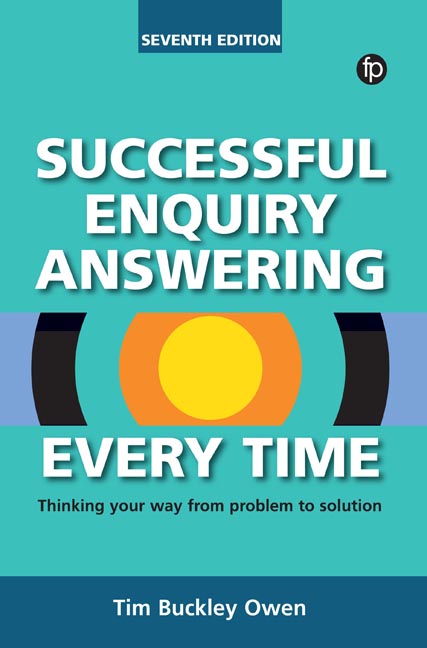Book contents
- Frontmatter
- Dedication
- Contents
- Introduction: Why thinking skills matter
- Eight essential thinking skills for successful enquiry answering
- 1 What do they really want? Using your analytical thinking skills to understand the question
- 2 Why remote enquiry handling is different Anticipating problems by thinking empathetically
- 3 Getting started Dealing with the panic by thinking imaginatively
- 4 Smarter searching Developing efficient search strategies by thinking systematically
- 5 Help! Everything's going wrong Using lateral thinking to get out of difficulties
- 6 Success! Now let's add some value Using your creative thinking skills to present your answer well
- 7 Don't just give me another reading list! Using critical thinking skills to add further value to your answer
- 8 Choosing your toolkit Using your predictive thinking skills to determine the resources you'll need
- Index
- Miscellaneous Endmatter
4 - Smarter searching Developing efficient search strategies by thinking systematically
Published online by Cambridge University Press: 08 June 2018
- Frontmatter
- Dedication
- Contents
- Introduction: Why thinking skills matter
- Eight essential thinking skills for successful enquiry answering
- 1 What do they really want? Using your analytical thinking skills to understand the question
- 2 Why remote enquiry handling is different Anticipating problems by thinking empathetically
- 3 Getting started Dealing with the panic by thinking imaginatively
- 4 Smarter searching Developing efficient search strategies by thinking systematically
- 5 Help! Everything's going wrong Using lateral thinking to get out of difficulties
- 6 Success! Now let's add some value Using your creative thinking skills to present your answer well
- 7 Don't just give me another reading list! Using critical thinking skills to add further value to your answer
- 8 Choosing your toolkit Using your predictive thinking skills to determine the resources you'll need
- Index
- Miscellaneous Endmatter
Summary
There's a saying in show business that amateurs rehearse so that everything goes right and professionals rehearse so that nothing goes wrong. It's a great definition of the difference between an amateur and a professional, in any profession.
Just think how it works with a show. Amateurs haven't a clue what could go wrong, so they have to rehearse everything equally. Professionals have the training, the knowledge, the experience to know where the danger points are in a production – the rapid scene change, the complex piece of business – and concentrate on those. Yet amateurs can manage to put on a good show eventually, with practice. And exactly the same applies to one of the most hazardous parts of enquiry work: searching.
The problem is that, since everyone has access now to an apparently limitless pool of instantly available information, anyone can assume that they're an expert searcher. So information professionals – the ones who earn their living by searching, or advising people on how to search – have to be able to demonstrate that there are ways of searching smarter, even when they're using exactly the same tools as their enquirers. What can distinguish you, the professional, from your enquirer, the amateur? A lot of it is down to thinking systematically.
Who needs to be able to search smarter?
The short answer is: everyone. It doesn't matter whether you're doing the searching yourself or helping others to do so, you need to understand the principles behind it so that the whole process happens as smoothly and efficiently as possible. Just think why …
If you're working in a public reference library you may well find yourself dealing with people to whom searching doesn't come naturally. A personal visitor may require a lot of hand-holding while you help them discover the information they need. At the same time, a queue may be building up at the enquiry desk – or, if you've gone on an expedition to the shelves with your enquirer, other people may start hovering round waiting for you to become free.
- Type
- Chapter
- Information
- Successful Enquiry Answering Every TimeThinking your way from problem to solution, pp. 65 - 86Publisher: FacetPrint publication year: 2017



